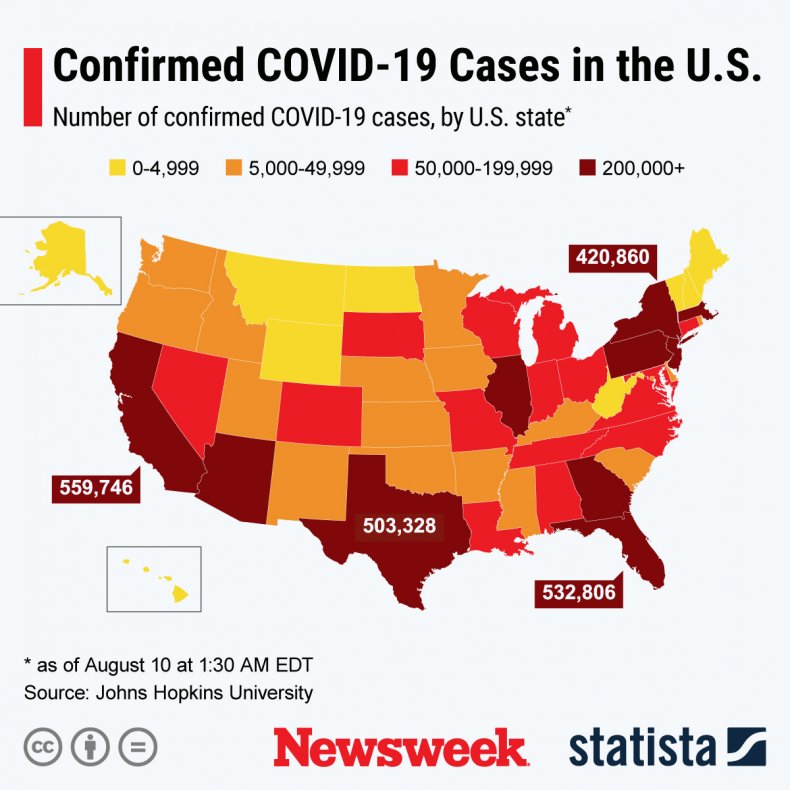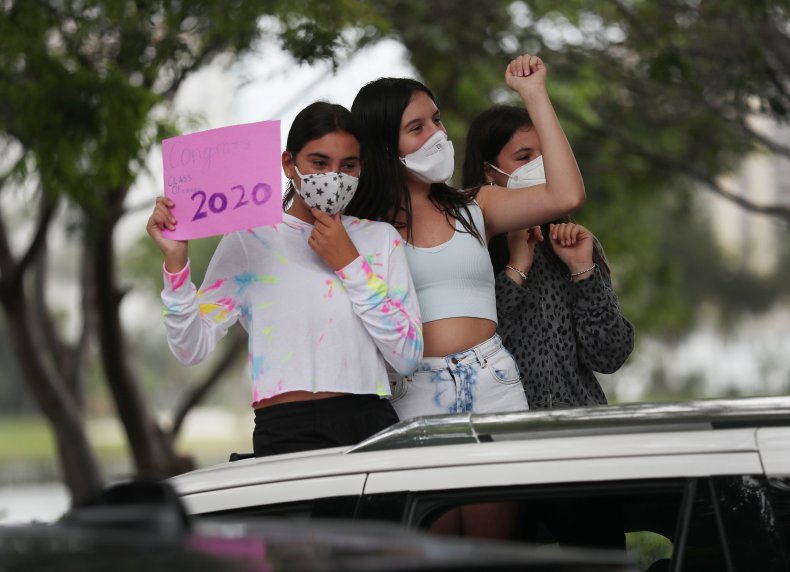As novel coronavirus deaths in Florida approach nearly 9,000, nearly three-quarters (73 percent) of Floridians would support a statewide decision to close public schools this fall, while 14.6 percent would be opposed to it, according to new research by the University of South Florida.
The university surveyed 600 Florida residents, fielded from July 30 to August 10, who were selected using a “stratified, quota sampling approach in order to ensure a representative sample of Florida’s population,” the report noted.
The survey showed 7.8 percent would “strongly oppose” statewide school closures, while 6.8 percent would “somewhat oppose” it. Thirteen percent of those surveyed said they “neither support nor oppose” school closures this fall, the report said.
Get your unlimited Newsweek trial >
More than half (54 percent) indicated they would “strongly support” the closure of schools in the autumn, while 18.5 percent would “somewhat support” it.
Floridians on statewide school closures
- Strongly support: 54 percent
- Somewhat support: 18.5 percent
- Neither support nor oppose: 12.8 percent
- Somewhat oppose: 6.8 percent
- Strongly oppose: 7.8 percent
Source: University of South Florida survey of 600 Florida residents, July 30 to August 10
Get your unlimited Newsweek trial >
Around 40 to 43 percent said they would “strongly support” other state-issued closures including the reclosing of bars, restaurants, beaches, public parks and houses of worship.
More than half (65.6 percent) also indicated they would be in support of the state issuing a new stay-at-home order, including 40.8 percent noting they would “strongly support” it, while 24.8 percent would “somewhat support” the measure, the report said.
Nearly three-quarters (73.3 percent) said they would “strongly support” the state requiring face masks in public spaces, while 68 percent would also “strongly support” the state placing stricter limits on the size of public gatherings.
The results of the latest survey are “reported with a 95 percent confidence level and a margin of error of +/-4,” the report noted.
Nearly half (48 percent) of those surveyed were aged 25-54, 18 percent were aged 55-64, 24 percent were aged 65 and over, while 10 percent were from 18 to 24 years of age, the report noted.
The regional distribution of the sample included:
- 23 percent from southeast Florida
- 18 percent from the Orlando/Daytona area
- 17 percent from the Tampa Bay metro area
- 14 percent from northeast Florida
- 11 percent from southwest Florida
- 10 percent from the Palm Beach/Treasure Coast area
- 7 percent from northwest Florida
Florida’s daily death toll has been climbing on a sharp incline from around the Fourth of July, according to Johns Hopkins University.
The state’s seven-day rolling average of daily new deaths mostly flattened from early April to early July, before sharply rising from around July 7 to August 4. It dropped for a few days before increasing again from August 9 through this week, according to data compiled by Worldometer.
However, the three-day rolling average of daily new cases in Florida has been falling in the past two weeks, according to the latest report Thursday by Johns Hopkins University.
Dramatic drops in new infections were reported from July 30 (9,535 average daily new cases) to August 4 (5,202 average daily new cases) and from August 7 (7,946 average daily new cases) to August 10 (5,405 average daily new cases), according to Johns Hopkins University.
Earlier this week, parents in Arizona rallied for the reopening of schools, despite the state having the highest number of child COVID-19 cases per capita in the U.S., according to a study by the American Academy of Pediatrics and the Children’s Hospital Association.
More than 20.9 million people globally have been infected since the virus was first reported in Wuhan, China, including over 5.2 million in the U.S. More than 12.9 million globally have reportedly recovered from infection, while over 759,700 have died, as of Friday, according to the latest figures from Johns Hopkins University.
The graphic below, provided by Statista, illustrates the spread of COVID-19 cases in the U.S.
 STATISTA
STATISTA


















